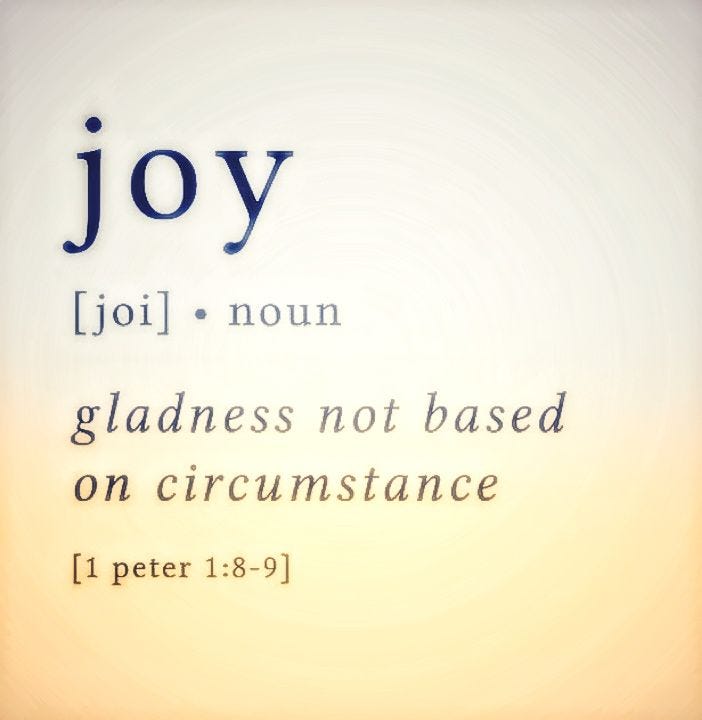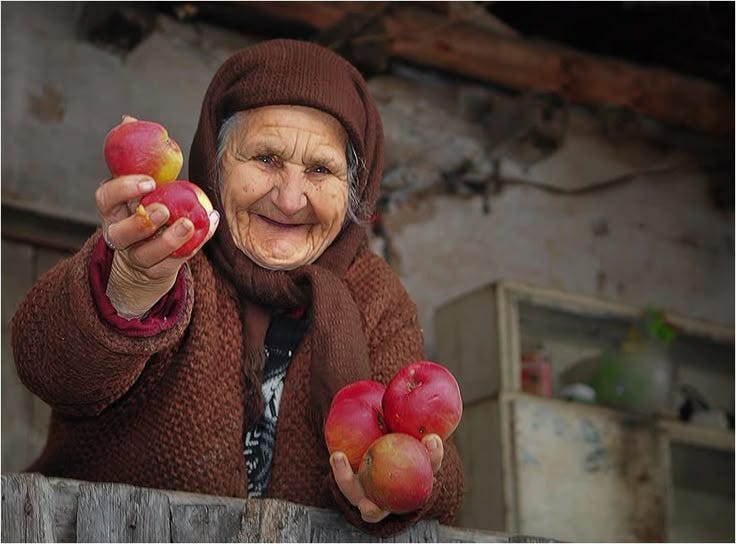Joy is a word that is kind of thrown around in a lot of different contexts, and honestly, can hold multiple meanings depending on who you ask.
As I have been pondering joy lately, I came across the definition that Henri Nouwen gives:
Joy is not the same as happiness. We can be unhappy about many things, but joy can still be there because it comes from the knowledge of God's love for us. We have to choose joy and keep choosing it every day. It is a choice based on the knowledge that we belong to God.1
Joy is grounded in reality. It is not escapism or the mere pleasure that we sometimes find in temporal things. Joy helps us to be fully present in each moment, where we experience the gift of God’s love for us.
Although we can be pulled into the mystery of joy spontaneously, living with joy is a choice. Sometimes we equate joy with the feeling of happiness, and though that can be part of it, joy is an attitude we can cultivate.
God wants us to be joyful. In fact, he requires it of us.
Rejoice in the Lord always; again I will say, rejoice. (Philippians 4:4)
Count it all joy, my brothers, when you meet trials of various kinds (James 1:2)
Ask, and you will receive, that your joy may be full. (John 16:24)
How does this fit into our day to day life, as parents, spouses, students, employees, friends and members of the Church?
I love what F. Buechner says about it: “The place God calls you to is the place where your deep gladness and the world’s deep hunger meet.” 2
Essentially, your vocation is how you are called to use your gifts in a way that allows your greatest joy to meet the world's needs.”
How do we discern where God is calling us to serve, and experience our greatest joy as it pertains to the world’s and specifically the Church’s needs?
One word: charisms.
charisms vs. talents
We all have talents. Maybe you have a knack for cooking, or can pick up any instrument with relative ease. These talents were likely passed onto you from your parents. Similarly, if you are baptized, you also have certain spiritual gifts. These are not genetic; rather, they are areas where you have been supernaturally empowered by God, in order that you can serve and help build up the Church. These are commonly called “charisms.”
Our understanding of charisms comes from the New Testament, where in multiple different letters, Paul speaks about spiritual gifts. Perhaps the most well known of these passages is 1 Corinthians 12:8-10:
“to one there is given through the Spirit a message of wisdom, to another a message of knowledge by means of the same Spirit, to another faith by the same Spirit, to another gifts of healing by that one Spirit, to another miraculous powers, to another prophecy, to another distinguishing between spirits, to another speaking in different kinds of tongues, and to still another the interpretation of tongues.”
This passage names some of the most widely recognized spiritual gifts– others have been recognized throughout the course of the Church’s history. These spiritual gifts – charisms – point to the fact that each of us is called to serve God in a unique way. Part of stepping into our vocation as Christians is discovering these gifts, and putting them to use in our immediate community. Doin so will not only lead to the betterment of the community, but will also lead to our own joy.
St. John Paul II reminds us:
God calls me and sends me forth as a labourer in his vineyard. He calls me and sends me forth to work for the coming of his Kingdom in history. This personal vocation and mission defines the dignity and the responsibility of each member of the lay faithful and makes up the focal point of the whole work of formation.3
my story of charism discernment
As part of my formation as a young adult, I was blessed to take the Called and Gifted course put on by the Catherine of Siena Institute. This course is designed to help Christians discern their charisms in a group setting, encouraging them to look at what ways God might be calling them to help build up his Kingdom. One of the first things we did was complete a Spiritual Gifts inventory, which helped highlight a few charisms that may have been given to us (sort of like a personality test, but for spiritual gifts). With that information, we were invited to choose one charism to intensely discern, through a process of feedback, reflection and action. I chose to discern the charism of knowledge. Simply put, the charism of knowledge “empowers a Christian to be a channel of God’s truth through diligent study and intellectual activity that enables us to better understand God, ourselves, and the universe.”4 I have always had a great love of learning and intellectual practices, so knowledge seemed to fit well with my experiences. The charisms of writing, music and prophecy also came up, but as we were encouraged to pick just one to discern, I felt that knowledge made the most sense for my current season of life.
Over the next few weeks, I met regularly with a small group to discuss and reflect on ways that this charism might be at work in my life. Now, my future husband just happened to be in that small group… but that’s a story for another day. ☺
I also journaled and took times of intentional prayer to ask the Holy Spirit how knowledge might be part of my call to serve the Church. At the end of the course, I felt confident in my discernment that I had indeed been given the gift of knowledge.
putting it into action
However, that discernment was only the starting point of truly embracing the gifts that God had given me. As I moved forward with further studies, finding a job and being involved in different ministries, I took notice of what opportunities really set my heart on fire.
One thing that helps us discern whether something is merely a talent or an actual charism is what we experience when we are actively exercising that gift in our Christian vocation. A charism will make us feel alive and full of joy, and they will meet a specific need that the Church has. Think “deep gladness.”
Having your heart set on fire is a sign that you may be working in a charism. Having a spiritual gift doesn’t just equate with being good at something. You should also feel a sense of joy and passion for what you are doing, and generally will also receive positive feedback from people who you are serving through using your gifts. Finally, in my experience, there is a deep sense of satisfaction and an interior knowledge that you are doing what God has called you to do.
Over the years, I have noticed how alive and joyful I feel when I am given the opportunity to share my intellectual reflections with others. This awareness has led me to further discern the charisms of writing and teaching, which are both ways that I can serve my local Catholic community and the Church at large. In recent years, I have been blessed to teach a Catholic Holistic Sexuality course to young adults, which is an opportunity where I can put my charisms of knowledge and teaching to use. Of course, this Substack and other Christian writing jobs are also part of that picture.
Discerning your charisms is an excellent way to become more aware of the Holy Spirit’s action in your life. If you feel like you don’t know where to start, I highly recommend taking the Called and Gifted workshop which is available online or in-person, or by simply learning more about the charisms on your own. If one stands out to you, take some time to try it on by being intentional in saying yes to opportunities where you are able to practice it. I also highly recommend the short yet profound book Let Your Life Speak by Parker J. Palmer on this topic.
Notice how you feel when you are serving in that way – do you experience joy? Do you receive positive feedback from others? These can be easy signs that you want to further discern this spiritual gift. Being able to serve with joy in specific areas brings life to the Church and to your own heart as well.
(This post was based on this article written for Behold Vancouver.)
Have a peaceful and joyful week!
Hannah Chartier
Things I’ve loved this week:
This recipe for cottage cheese waffles.
This podcast episode from make joy normal.
Thrifted linen overalls similar to these.
The Heart of Henri Nouwen: His Words of Blessing by Henri Nouwen, Michael J. Christensen, Rebecca Laird
Now and Then: A Memoir of Vocation
Christifideles Laici, 58
St. Joelo.org: Spiritual Gifts Discernment






